2017-2018学年上海牛津沪教版英语六年级下册全册教案
- 格式:doc
- 大小:231.50 KB
- 文档页数:41
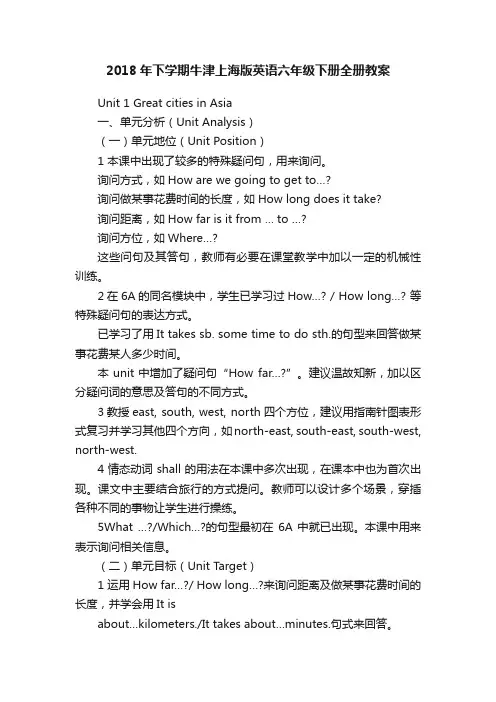
2018年下学期牛津上海版英语六年级下册全册教案Unit 1 Great cities in Asia一、单元分析(Unit Analysis)(一)单元地位(Unit Position)1 本课中出现了较多的特殊疑问句,用来询问。
询问方式,如How are we going to get to…?询问做某事花费时间的长度,如How long does it take?询问距离,如How far is it from … to …?询问方位,如Where…?这些问句及其答句,教师有必要在课堂教学中加以一定的机械性训练。
2在6A的同名模块中,学生已学习过How…? / How long…? 等特殊疑问句的表达方式。
已学习了用It takes sb. some time to do sth.的句型来回答做某事花费某人多少时间。
本unit中增加了疑问句“How far…?”。
建议温故知新,加以区分疑问词的意思及答句的不同方式。
3教授east, south, west, north四个方位,建议用指南针图表形式复习并学习其他四个方向,如north-east, south-east, south-west, north-west.4情态动词shall的用法在本课中多次出现,在课本中也为首次出现。
课文中主要结合旅行的方式提问。
教师可以设计多个场景,穿插各种不同的事物让学生进行操练。
5What …?/Which…?的句型最初在6A中就已出现。
本课中用来表示询问相关信息。
(二)单元目标(Unit Target)1 运用How far…?/ How long…?来询问距离及做某事花费时间的长度,并学会用It isabout…kilometers./It takes about…minutes.句式来回答。
2 掌握V+doing. 如love eating/enjoy swimming.3 操练有关How/Wh-的各种提问及其回答。
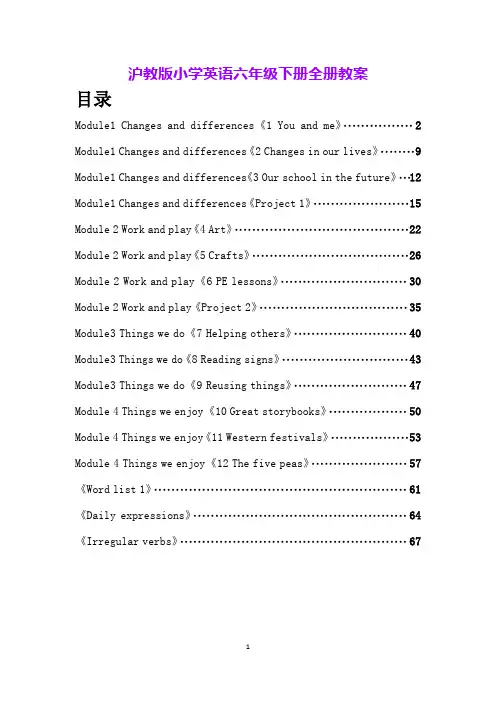
沪教版小学英语六年级下册全册教案目录Module1 Changes and differences《1 You and me》 (2)Module1 Changes and differences《2 Changes in our lives》 (9)Module1 Changes and differences《3 Our school in the future》 (12)Module1 Changes and differences《Project 1》 (15)Module 2 Work and play《4 Art》 (22)Module 2 Work and play《5 Crafts》 (26)Module 2 Work and play《6 PE lessons》 (30)Module 2 Work and play《Project 2》 (35)Module3 Things we do《7 Helping others》 (40)Module3 Things we do《8 Reading signs》 (43)Module3 Things we do《9 Reusing things》 (47)Module 4 Things we enjoy《10 Great storybooks》 (50)Module 4 Things we enjoy《11 Western festivals》 (53)Module 4 Things we enjoy《12 The five peas》 (57)《Word list 1》 (61)《Daily expressions》 (64)《Irregular verbs》 (67)Module1 Changes and differences《1 You and me》1教学目标1、能简单询问别人的长相,以及相关的具体个人信息,并能进行比较。
例如:What’s …like? How tall are you? How hea vy are you? How old are you?How long…? How bi g…?2、能听懂会说: I’m…than …. My …than your s…My …kg...My…cm long.等句子,并能在实际情景中运用。

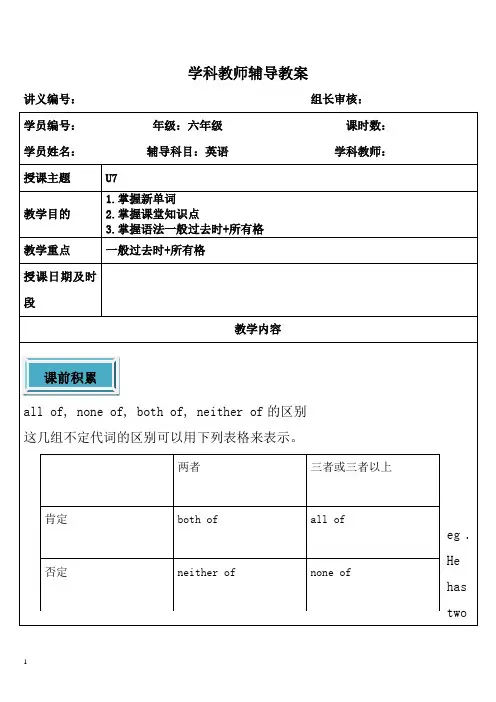

上海六年级牛津英语下册教案范文集锦全面贯彻“三个面向”战略指导思想,渗透和灌输可持续发展的战略思想。
以素质教育为根本宗旨,以培养创新精神和实践能力为重点,充分发挥学生的潜能,提高学生的全面素质和自学能力。
那么在学习英语的过程中有哪些教案会比较好呢?以下是小编带来的上海六年级牛津英语下册教案内容,感谢您的阅读,希望能帮助到您!上海六年级牛津英语下册教案1Unit 1 Who is younger?一、语音:ir字母组合在单词中的发音 /E:/二、单词和习惯用语: (共21个)四会单词和习惯用语(9个):young年轻的 go for a walk 去散步 glad 高兴的,乐意的as…as 和……一样 tall高的 than比 short短的、矮的 strong 强壮的 heavy 重的三会单词(10个):chat聊天 light轻的 sit(sat)坐 meet(met)遇见、见面 twin (双胞胎)之一 as作为 minute分钟 only惟一的、仅有的 child孩子(children 孩子们)centimeter 厘米二会单词(2个): height身高 weight体重三、词组:1.on Sunday morning 在星期天早晨2.go for a walk 去散步3. look the same 看起来一样4.as tall as 与…..一样高 as fat as 与…..一样胖as long as 与….一样长5. shorter than 比….矮bigger than比大heavier than比重6. twenty minutes younger小二十分钟7.one year older大一岁9.be glad to do 非常高兴做某事10.a twin sister 双胞胎姐妹11.how old 多大12.the only child 仅有的一个孩子13.a tall boy 一个高个子的男孩14.a young teacher 一位年轻的教师15.some heavy boxes 一些重的盒子16.your old friend(s)你的老朋友17.a strong goalkeeper 一个强壮的守门员18.the girl in red 穿红衣服的女孩19.yours or mine 你的还是我的20.look young 看起来年轻21.have a chat 聊天、闲谈四、形容词比较级:A.直接加er/rtall---________light----________young--_________old---________strong--___ small--_________late---_________long---_________short--________ nice--- _____B.双写加erbig-------_________ fat-----_________ thin---________ hot---________C.去y改i加erheavy---_________ early---__________ busy---__________D不规则good---_______ many---________ much---______ bad/ill ---_____ little---_______五、句型:1、A+谓语(be动词)+形容词比较级+than +B A比B……Who’s younger than him ? 谁比他年轻?My brother is younger than him . 我弟弟比他年轻。
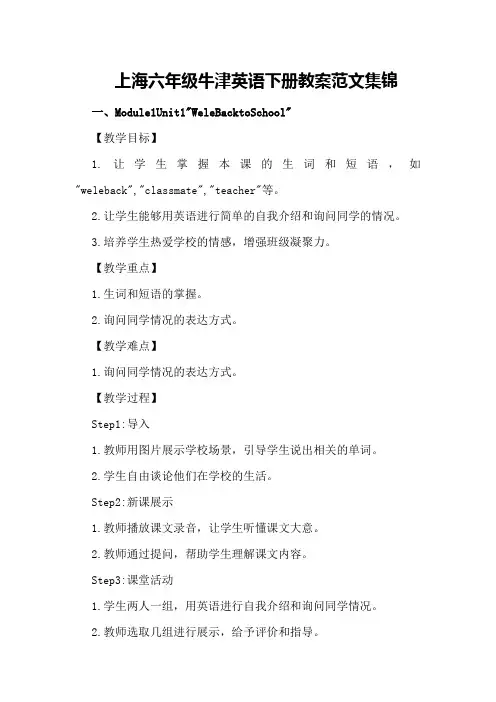
上海六年级牛津英语下册教案范文集锦一、Module1Unit1"WeleBacktoSchool"【教学目标】1.让学生掌握本课的生词和短语,如"weleback","classmate","teacher"等。
2.让学生能够用英语进行简单的自我介绍和询问同学的情况。
3.培养学生热爱学校的情感,增强班级凝聚力。
【教学重点】1.生词和短语的掌握。
2.询问同学情况的表达方式。
【教学难点】1.询问同学情况的表达方式。
【教学过程】Step1:导入1.教师用图片展示学校场景,引导学生说出相关的单词。
2.学生自由谈论他们在学校的生活。
Step2:新课展示1.教师播放课文录音,让学生听懂课文大意。
2.教师通过提问,帮助学生理解课文内容。
Step3:课堂活动1.学生两人一组,用英语进行自我介绍和询问同学情况。
2.教师选取几组进行展示,给予评价和指导。
Step4:课堂小结2.学生分享他们在课堂活动中的收获。
【作业】1.复习本课的生词和短语。
2.编写一段对话,用英语介绍自己和询问同学的情况。
二、Module2Unit2"MyFavouriteSeason"【教学目标】1.让学生掌握本课的生词和短语,如"season","favourite","cold","hot"等。
2.让学生能够用英语描述自己最喜欢的季节及原因。
3.培养学生热爱自然、关注季节变化的能力。
【教学重点】1.生词和短语的掌握。
2.描述季节及原因的表达方式。
【教学难点】1.描述季节及原因的表达方式。
【教学过程】Step1:导入1.教师展示四季的图片,引导学生说出相关的单词。
2.学生自由谈论他们最喜欢的季节。
Step2:新课展示1.教师播放课文录音,让学生听懂课文大意。
2.教师通过提问,帮助学生理解课文内容。
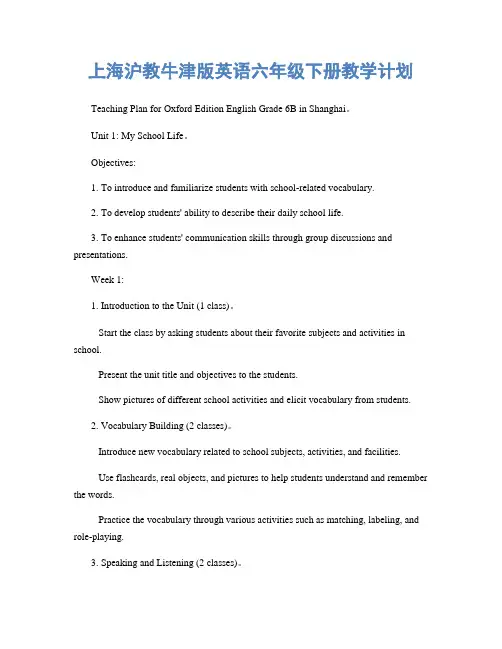
上海沪教牛津版英语六年级下册教学计划Teaching Plan for Oxford Edition English Grade 6B in Shanghai。
Unit 1: My School Life。
Objectives:1. To introduce and familiarize students with school-related vocabulary.2. To develop students' ability to describe their daily school life.3. To enhance students' communication skills through group discussions and presentations.Week 1:1. Introduction to the Unit (1 class)。
Start the class by asking students about their favorite subjects and activities in school.Present the unit title and objectives to the students.Show pictures of different school activities and elicit vocabulary from students.2. Vocabulary Building (2 classes)。
Introduce new vocabulary related to school subjects, activities, and facilities.Use flashcards, real objects, and pictures to help students understand and remember the words.Practice the vocabulary through various activities such as matching, labeling, and role-playing.3. Speaking and Listening (2 classes)。
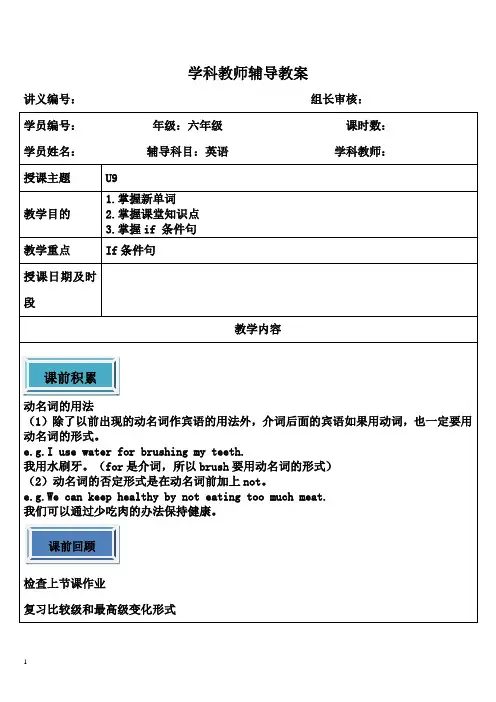
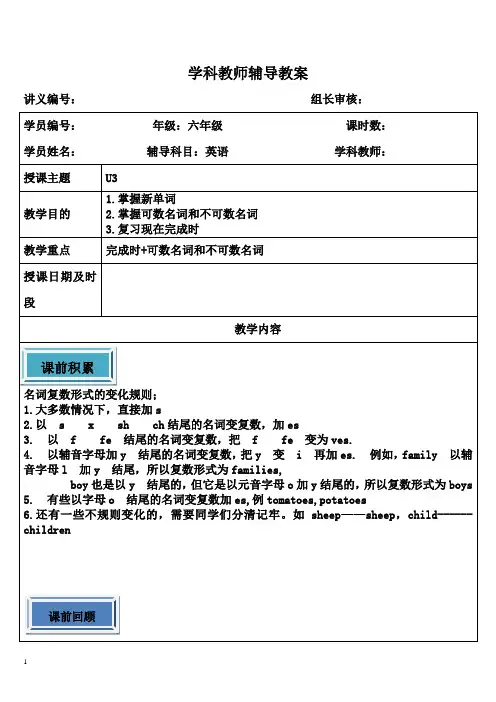
学科教师辅导教案讲义编号:组长审核:Lose 失去 lose memory 失忆 lose one’s way 迷路 lose one’s eyesight失去视力 lose one’s job 失业danger n.危险 be in danger 处于危险中 dangerous adj.危险的 ---反义词 safe Remember v. 记得 memory n.记忆力 remember to do sth 记得去做某事(未做)Remember doing sth 记得做过某事(已做) forget to do sth 忘记去做某事(未做)Forget doing sth 忘记做过某事(已做)Would rather do sth than do sth 宁愿做某事不愿做...Send sth to sb =send sb sth 寄给某人某物2.讲解课文P14-P17 would like to do sth =want to do sth 想要做....Thousand 千表示具体数量不加s two thousand 表示成千上万加s thousands of One’s job is to do sth 某人的工作是去做.... listen to sb 听某人的话The fifth day of the fifth lunar month of that year 农历五月初五Rice dumplings with meat 肉粽 rice dumplings without meat 不加肉的粽子Ones 一些 one 一个 a piece of 一片作文:Spring festival 传统节日:春节The Spring Festival is coming. I will help my mother clean the windows and wash the clothes. I will put on duilian on the door and chuanghua on the window.People usually go home to spend the festival with their family. They have a big family get together. The Chinese people have big meals and watch TV during the Spring Festival. They also visit their friends and relatives.The underlined part means “________”.A. AboutB. Less thanC. OverD.little( ) 7. Ben’s mother is not at home. He _________ look after his younger sister.A. has toB. have toC. need toD. must to ( ) 8. I don’t like coffee ____________ sugar. It’s too sweet.A. withB. withoutC. hasD. /( ) 9. --Where is your brother? -- He __________ to the library.A. has goneB. has beenC. goesD. went( ) 10. Bangkok is _________ of Shanghai.A. south-westB. to the west-southC. west-southD. in the south west ( ) 11. I spent____________ making this model plane.A. a half and an hourB. one and a half hoursC. one and a half hourD. an and half hours( ) 12. My father’s job is ___________ sick people better.A. makeB. makingC. to makeD. makes( ) 13. It’s too hot outside. I’d rather not _______ out!A. goB. goingC. to goD. goes( ) 14. There are many skirts in the shop. Do you like this red ________?A. oneB. onesC. one’sD. once( ) 15. --Would you like ______ orange juice? -- _______________.A. any … No, thanksB. some … Of courseC. some … Yes, pleaseD. an … No, thanks。
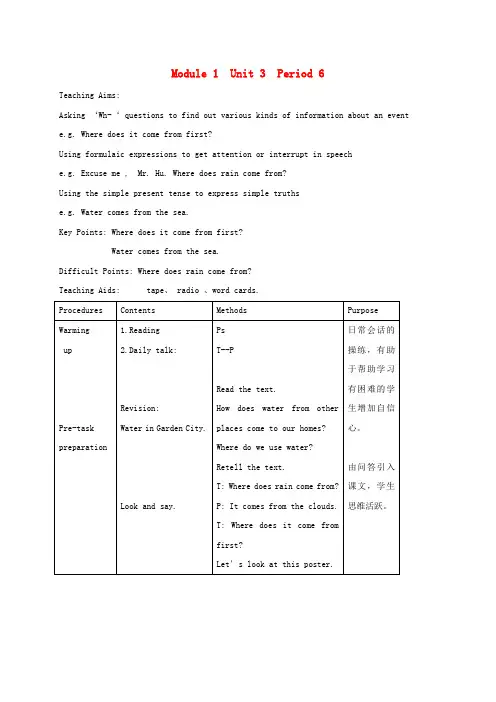
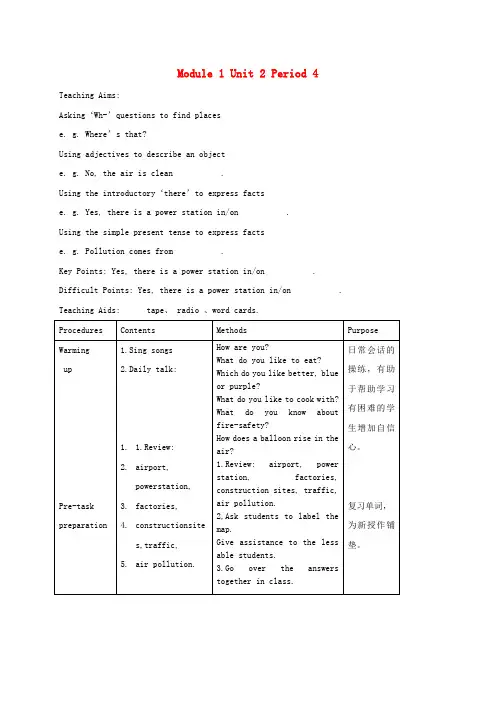
最新沪教版六年级英语下教学设计M1 Changes and differencesUnit1 You and me教学内容与目标教学内容功描述,询问● 询问身高及体重。
能● 描述差异语核心句型和●I ’m 150 centimeters tall.言日常用语●I usually play football after school.知●There are a lot of tall buildings in the city.识●How exciting!●That ’s fantastic!词汇Weigh, kilogram, centimeter,fan, theatre, go fishing,enjoyoneself语音a, a-e, ai, ay, eigh, i, i-e, y, igh,ie语听● 听懂谈论彼此身高体重和课余生活的对话。
言说● 用恰当的句型说说自己的身高、体重,介绍自己的课余生活技●用 There be 句型说说自己居住的环境。
能读● 读懂关于彼此身高、体重及课余生活差异的对话。
● 读懂关于城市与乡村差异的短文。
写● 能结合语境用正确的句子写写个人情况和生活环境。
教学目标● 能在语境中正确运用本单元的核心词汇,复习已学过的核心词。
● 能用用恰当的句型说说自己的身高、体重,介绍自己的课余生活,说说自己居住的环境●根据字母 a, a-e, ai, ay, eigh, i, i-e, y, igh,ie的发音规律,能拼读简单的单词。
● 能理解和尊重来自不同文化背景的人。
教学重点:●词汇: Weigh, kilogram, centimeter, fan, theatre, go fishing, enjoy oneself●句型: I ’m 150 centimeters tall. I usually play football after school.There are a lot of tall buildings in the city. How exciting! That’s fantastic!●字母 a, a-e, ai, ay, eigh, i, i-e, y, igh,ie教学点:一般在 be 、 do 和there be 在中的音。